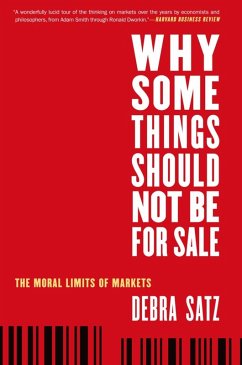What's wrong with markets in everything? Markets today are widely recognized as the most efficient way in general to organize production and distribution in a complex economy. And with the collapse of communism and rise of globalization, it's no surprise that markets and the political theories supporting them have seen a considerable resurgence. For many, markets are an all-purpose remedy for the deadening effects of bureaucracy and state control. But what about those markets we might label noxious-markets in addictive drugs, say, or in sex, weapons, child labor, or human organs? Such markets arouse widespread discomfort and often revulsion. In
Why Some Things Should Not Be for Sale, philosopher Debra Satz takes a penetrating look at those commodity exchanges that strike most of us as problematic. What considerations, she asks, ought to guide the debates about such markets? What is it about a market involving prostitution or the sale of kidneys that makes it morally objectionable? How is a market in weapons or pollution different than a market in soybeans or automobiles? Are laws and social policies banning the more noxious markets necessarily the best responses to them? Satz contends that categories previously used by philosophers and economists are of limited utility in addressing such questions because they have assumed markets to be homogenous. Accordingly, she offers a broader and more nuanced view of markets-one that goes beyond the usual discussions of efficiency and distributional equality--to show how markets shape our culture, foster or thwart human development, and create and support structures of power. An accessibly written work that will engage not only philosophers but also political scientists, economists, legal scholars, and public policy experts, this book is a significant contribution to ongoing discussions about the place of markets in a democratic society.
Dieser Download kann aus rechtlichen Gründen nur mit Rechnungsadresse in A, B, BG, CY, CZ, D, DK, EW, E, FIN, F, GR, HR, H, IRL, I, LT, L, LR, M, NL, PL, P, R, S, SLO, SK ausgeliefert werden.
Hinweis: Dieser Artikel kann nur an eine deutsche Lieferadresse ausgeliefert werden.









